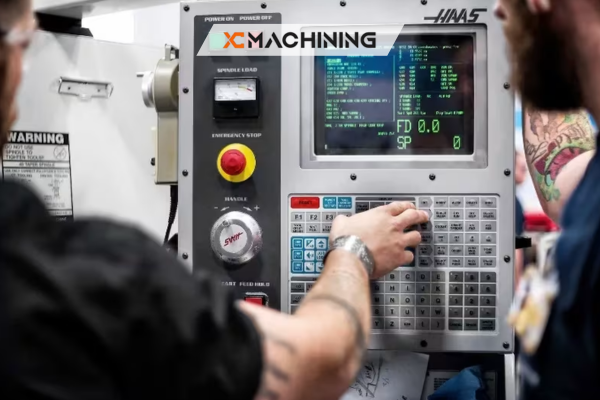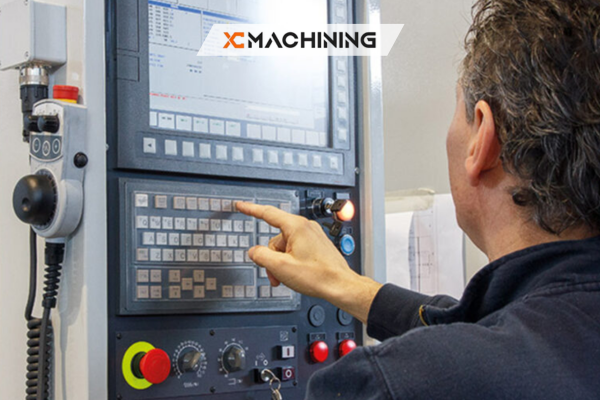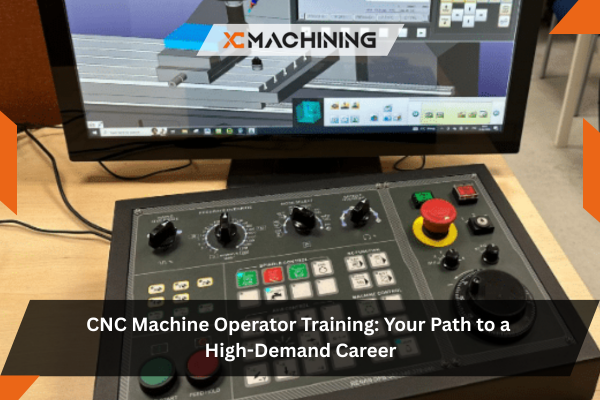Imagine walking into a factory, where the air hums with the sound of machines. There’s a buzz of activity, and everything seems to be running smoothly. But behind the scenes, there’s a lot more going on than you might think. And the machines are all operated by skilled workers CNC machine operators. These operators are in high demand, and for good reason. They control the machines that shape and form materials into exactly what different industries need. If you’re looking for a stable, rewarding career, CNC machine operator training could be your gateway to success.
Whether you’re fresh out of school or considering a career change, this could be the perfect fit. But before you can step into this in-demand job, you need the right training. So, what does that training look like, and why should you consider it? Let’s explore the world of CNC machine operation and how you can start your path toward a great career.
What Is a CNC Machine Operator?
Before jumping into the training process, let’s first understand the role of a CNC machine operator. CNC stands for Computer Numerical Control. Simply put, CNC machining are tools that are controlled by computers to cut, shape, and carve materials like metal, wood, or plastic. These machines are used across many industries, from automotive to aerospace, to create parts with extreme accuracy and speed.
CNC machine operators are responsible for setting up and running these machines. They load the material, input the necessary commands into the machine’s computer, and monitor the entire process to ensure everything runs smoothly. This job requires a mix of technical skills, problem-solving abilities, and a keen eye for detail. It’s a job that combines working with your hands and using advanced technology, making it a rewarding and dynamic field.
How CNC Machine Operator Training Sets You Up for Success
CNC machine operator training sets you up for success by teaching you not just the technical skills needed for the job, but also the essential soft skills that make you an effective worker. You’ll learn how to manage your time efficiently, collaborate with other team members, and communicate effectively in a work environment. These soft skills are often just as important as technical proficiency and help you stand out as a top candidate.
Here’s how CNC training helps you succeed:
- Hands-on experience: You’ll practice with actual machines, building confidence in real-world scenarios.
- Problem-solving skills: Learn how to address machine errors and production issues quickly.
- Teamwork: Collaborate with supervisors and colleagues for efficient operations.
- Work ethic: Gain valuable work habits like attention to detail, responsibility, and time management.
So, by developing both technical and soft skills, you’ll be well-equipped to thrive in this dynamic and evolving field.

Why CNC Operators Are in High Demand
Now, you might be wondering what kind of training you need to become a CNC machine operator. Well, the answer is simple—CNC machines are everywhere, and they’re essential in making products we use every day. From car parts to smartphones, CNC machines are behind the scenes, shaping everything from small components to massive structures.
As technology continues to improve, the demand for skilled CNC machine operators only increases. Recent data shows that the demand for skilled manufacturing workers, including CNC operators, is expected to grow by 9% over the next decade. This is faster than the average for most other occupations, which means job security for those trained in this field.
The skills of CNC machine operators are versatile, too. They can work in various industries, including:
- Aerospace: Creating complex parts for aircraft and space exploration.
- Automotive: Manufacturing components for cars and trucks.
- Medical Devices: Producing precise parts for healthcare equipment.
- Consumer Goods: Making everything from kitchen appliances to electronics.
What Does CNC Machine Operator Training Involve?
Now, you might be wondering what kind of training is required to become a CNC machine operator. The good news is that CNC training doesn’t require years of schooling. It’s a relatively quick and hands-on path to a career with good pay and job stability. But don’t be fooled—it’s not all about pushing buttons. Face milling operations need to understand the machines, the materials, and the safety procedures involved in the process.
Most CNC machine operator training programs focus on a few key areas:
- Machine operation: Learning how to set up and operate different types of CNC machines.
- Blueprint reading: Understanding the diagrams and designs that guide the machining process.
- Programming: Inputting the correct commands into the machine’s computer for specific cuts and shapes.
- Safety protocols: Ensuring a safe working environment by following strict guidelines for machine handling and material management.
Some programs may also include basic math, which is important for calculating measurements and understanding machine tolerances. While some of this can sound technical, it’s all part of the hands-on experience that makes you a capable CNC operator.
How Long Does CNC Machine Operator Training Take?
When it comes to time commitment, CNC machine operator training is relatively short compared to other technical careers. Most programs can be completed in 6 months to a year, depending on whether you pursue part-time or full-time study.
For example, community colleges, trade schools, and online programs typically offer certificate or diploma courses. If you already have experience working in manufacturing or a related field, you might be able to complete the program even faster. Many schools also offer internship or apprenticeship opportunities, which allow you to gain real-world experience while still learning.
It’s important to note that some employers might require a two-year associate degree for CNC operators, particularly for positions that involve more complex machines or higher-level programming. But even with just a certificate, you’ll still be well on your way to a rewarding career.
What Skills Do You Need to Become a CNC Machine Operator?
While CNC machine operator training covers many of the technical aspects of the job, you’ll need a few core skills to succeed in this field. Here are some of the most important skills that will help you stand out:
- Attention to Detail: CNC machines work with incredible precision, so you’ll need a keen eye for detail to ensure everything is just right.
- Problem-Solving: Machines can sometimes malfunction or require adjustments, so being able to troubleshoot and fix problems on the fly is crucial.
- Technical Understanding: Understanding how machines work and how to interpret machine codes will be essential.
- Mathematical Skills: Basic math, including measurement conversions, will help you accurately program and operate the machines.
- Physical Stamina: While the job isn’t overly strenuous, you will be on your feet for extended periods and need to be comfortable working in a shop environment.
Being tech-savvy is also a big plus, especially since you’ll be working with computer-controlled machinery. If you’re already comfortable using computers and technology, this can give you an edge in training.
The Earning Potential for CNC Operators
One of the best things about becoming a CNC machine operator is the earning potential. While the salary can vary depending on your experience, location, and industry, CNC prototype machining generally make good money.
The average salary for a CNC machine operator in the U.S. is around $45,000 per year. However, more experienced operators or those in specialized fields can earn upwards of $60,000 to $70,000 annually. Some positions even offer benefits like health insurance, retirement plans, and paid time off, making it a great career choice overall.
If you want to increase your earning potential even further, there are opportunities to advance. As you gain experience, you could move into supervisory roles, machine programming, or even machine maintenance, all of which come with higher salaries.
CNC Machine Operator Training: Unlocking Career Flexibility
One of the biggest advantages of being a CNC machine operator is the flexibility it offers. Unlike other careers that may be limited to one industry or job type, CNC operators have the opportunity to work in various sectors, from automotive to aerospace and even healthcare. The skills you acquire during your training are transferable across multiple fields, giving you the freedom to explore different career paths.
Key benefits of this flexibility include:
- Industry diversity: Work in a range of fields like aerospace, automotive, medical devices, and more.
- Geographic flexibility: CNC operators are needed worldwide, opening up opportunities for relocation.
- Job variety: The chance to work with different machines, materials, and projects keeps the job exciting.
- Career growth: Gain expertise in different areas, like CNC programming, to advance your career.
This variety makes the career path of a CNC machine operator both exciting and full of possibilities, offering endless opportunities for growth.
CNC Machine Operators and Job Stability
CNC machine operators have some of the most stable jobs available today. In fact, the U.S. Bureau of Labor Statistics predicts that jobs for CNC machine operator will continue to grow. With the rise of automation, there’s an increasing need for skilled workers who can manage and operate these advanced machines.
Industries like automotive manufacturing, aerospace, and metalworking are particularly dependent on CNC machines, so job security is high in these sectors. And since so many companies rely on CNC machines for production, skilled operators are in demand across the country, not just in big cities but in smaller towns as well.
Job stability is a huge advantage, especially in today’s economy, where many industries are shifting rapidly. As more companies turn to advanced technology for production, the demand for CNC machine operators is growing.

The Role of CNC Machine Operators in Modern Manufacturing
CNC machine operators are the backbone of modern manufacturing. These professionals play a crucial role in producing everything from tiny electronic parts to large-scale car components. As industries continue to evolve, a CNC machine operator is essential to keep the wheels of innovation turning. The rise of automation, coupled with advances in technology, has made CNC machining magnesium indispensable in ensuring high-quality, precise, and timely production.
Key aspects of a CNC operator’s role include:
- Precision: Ensuring every part is cut to the exact specifications with minimal errors.
- Efficiency: Running machines to keep production running smoothly and efficiently.
- Adaptability: Being able to adjust settings for different projects or materials.
- Quality control: Monitoring machine outputs and making adjustments to maintain quality.
CNC machine operators play a critical role in shaping the future of manufacturing and are at the forefront of innovation across industries.
Conclusion
If you’re looking for a career that combines hands-on work with the latest technology, becoming a CNC machine operator could be the perfect fit. It’s a career with plenty of job opportunities, good pay, and room for growth. The training is relatively short, and you can start working in a rewarding field quickly.
Plus, with industries like aerospace, automotive, and medical device manufacturing constantly needing skilled workers, the demand for CNC machine isn’t going away anytime soon.
So, do you think CNC machine operator training is the right path for you? With the right skills and training, you could be well on your way to a long and successful career in a high-demand field. The only question left is: Are you ready to start?
FAQs
What is a CNC machine operator?
A CNC machine operator runs computer-controlled equipment that cuts, shapes, or processes materials. They set up machines, monitor operations, and ensure parts meet specifications, playing a critical role in manufacturing industries like aerospace, automotive, and electronics.
What skills are needed to become a CNC operator?
Key skills include basic math, mechanical aptitude, attention to detail, and problem-solving abilities. Familiarity with CAD/CAM software, blueprint reading, and knowledge of materials and tools are also essential for operating CNC machines effectively.
What career advancement opportunities exist for CNC operators?
CNC operators can advance to roles like CNC programmers, production supervisors, or manufacturing engineers. Gaining expertise in programming and equipment maintenance opens doors to higher-paying and more specialized positions.
How does CNC training prepare operators for real-world challenges?
Training equips operators with practical skills to troubleshoot machine errors, maintain quality standards, and work efficiently under deadlines. Hands-on experience with real CNC equipment ensures readiness for industrial environments.





